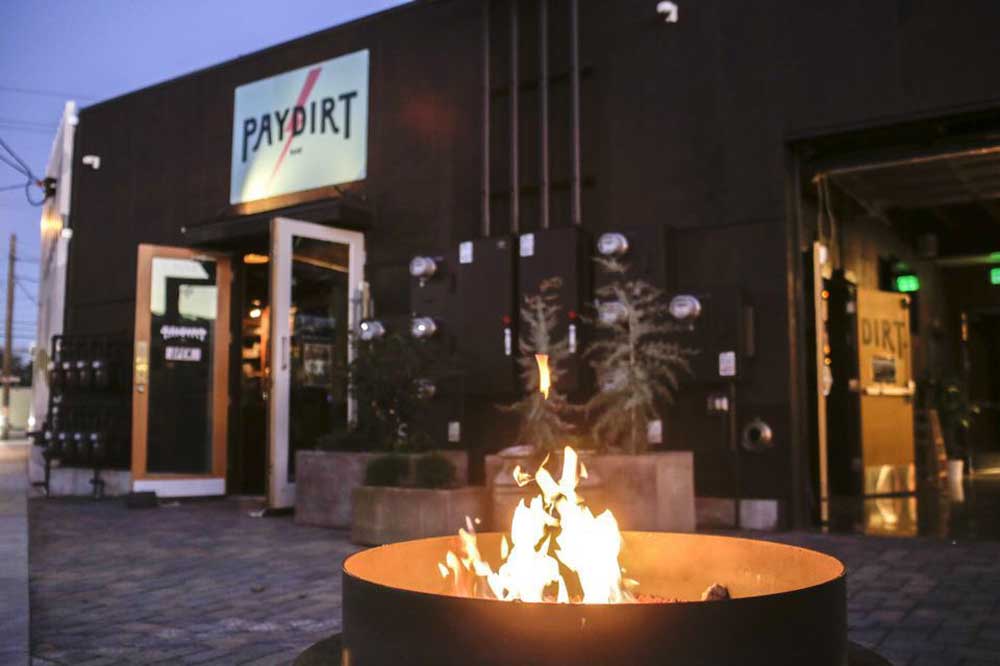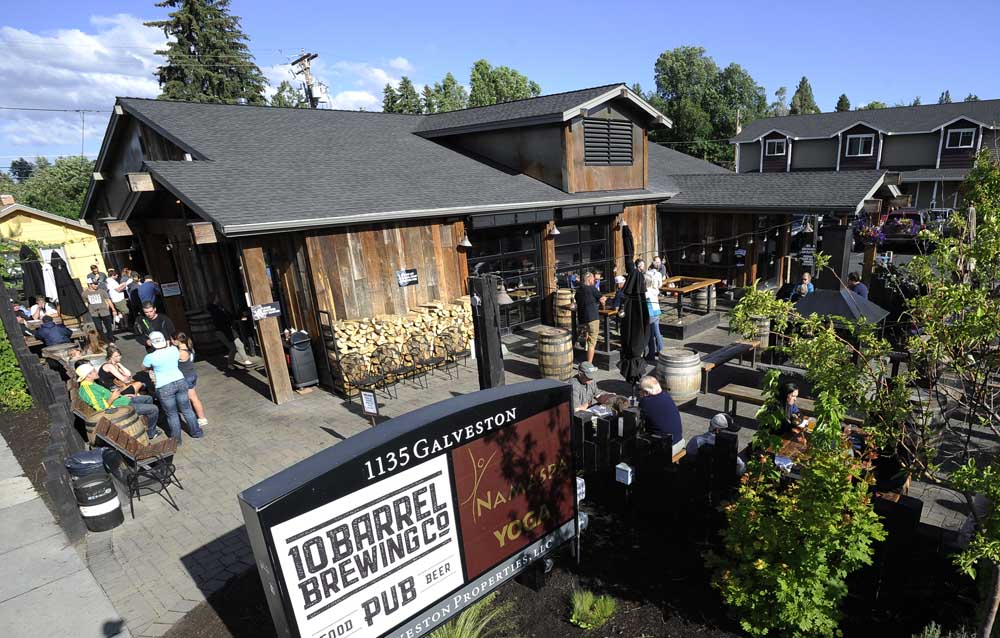For Portland bar’s owners, small business dreams are on hold and future feels uncertain amid coronavirus shutdown
Published 9:30 pm Wednesday, April 8, 2020

- The owners of Paydirt, a popular bar in The Zipper building off NE Sandy, have been forced to close doors at four taverns and layoff 47 employees because of the coronavirus pandemic. Stephanie Yao Long/Staff
Their dream was hatched late one night over adult beverages at a dive bar in North Portland.
Ezra Caraeff and John Naekel had just finished playing in a softball game and, like most city league softball games, it ended with a round of drinks. As the beer flowed and the night grew long, the conversation shifted toward dreams, and Caraeff asked Naekel what he would do for a living if he ever quit his day job.
“Well,” Naekel said, “I’ve always wanted to open up a neighborhood bar. Kind of like ‘Cheers.’”
The banter eventually moved on, the beers kept coming, and by the end of the night the friends hopped in cabs and went their separate ways. But Caraeff couldn’t shake the thought of “Cheers.” So the next day, he reached out to Naekel with a question that would change their lives: “How serious were you about wanting to own a bar? I’ve always wanted to do that, too.”
“I’m serious,” Naekel said. “We’re not the dumbest guys on earth. We could find a way to figure it out.”
Four-and-a-half years later, in 2011, The Old Gold opened its doors in the Overlook Neighborhood, offering North Portland a cozy and cool watering hole with a drool-worthy selection of whiskey, friendly barkeeps, roomy booths outfitted with “Champagne Buttons” and an impressive wooden White Stag–like “Drink in Oregon” sign. The bar became so beloved, the owners went on to open another joint (Paydirt), then another (Tough Luck) and then another (Hi-Top Tavern), with a fifth in the works.
Together, with business partner Chip Addabbo, Naekel and Caraeff employed nearly 50 people, sponsored neighborhood little league teams and hosted fundraisers for local elementary schools. During a memorable decade, the trio didn’t just create a dream Sam Malone would envy, but also a thriving small business.
Then the coronavirus cascaded across the United States, COVID-19 arrived in Oregon and small businesses closed their doors to help “flatten the curve.” More than 10 million Americans filed for unemployment in March — including nearly 100,000 in Oregon last week alone — as statewide stay-at-home mandates and fears over the spread of COVID-19 plunged the economy into a deep freeze. The service and hospitality sector has been perhaps the hardest hit, as bars and restaurants — including The Old Gold, Paydirt, Tough Luck and Hi-Top Tavern — have shuttered doors without any clue of when they might reopen.
“Worst day of my life”
When it became clear that the novel coronavirus was far more grave than President Trump and his administration had been telling the country, Addabbo, Naekel and Caraeff began a seemingly never-ending string of group phone chats, text messages and emails focused on how they would keep their business alive and their staff employed.
The weekend before Gov. Kate Brown issued a statewide order to close bars and restaurants, the owners made the painful decision to temporarily shutter their doors.
“Worst day of my life,” Caraeff tweeted on March 15.
They began calling employees that night, then announced the news a day later on social media.
“We’ll do everything in our power to assist our staff during this time and promise we will be back soon,” the announcement read on twitter. “Please be a good neighbor to each other. We love you Portland, and we will get through this.”
They debated keeping their staff of 47 employed during the shutdown. But they would have quickly run out of limited cash reserves and accumulated a mountain of debt.
In a holding pattern
Even as doors remained shut, the bills kept coming.
Caraeff contacted the landlords of each establishment to discuss lease options, reached out to utility companies, garbage collectors and other businesses they pay regular bills to. The responses were mixed.
Kevin Cavenaugh of Gorilla Development wrote his tenants an email on March 18 saying, essentially, “We’re all in this together and no one is paying rent for April.”
Another property owner extended the bar owners a similar olive branch, saying, “Let’s start a dialogue and work this out.” The other two property owners provided no relief, demanding full payments as scheduled.
As Caraeff plowed through his calls, each business offered different levels of empathy and support. The garbage company was easy to work with and paused collection service. Comcast Cable? Not so much.
While Caraeff negotiated with bill collectors, all three owners dug into the Rubik’s Cube involved in applying for small business loans and federal relief, a process that turned out to be both emotionally and mentally draining.
The owners have applied for every federal loan available, and it’s been an adventure.
The details behind the loans, including interest rates and amounts, are unclear. The extent of the relief is vague. And the process and requirements necessary to apply and gain approval have changed numerous times in just three weeks.
The first move was to apply for the Small Business Association Economic Injury Disaster Loan. Naekel started the process immediately, creating an account, filling out the application and uploading 40 documents detailing finances of the business. Initially, he was able save his progress as he chased down and inputted information. But one time he logged in and the website had crashed, displaying a message urging applicants to return during “off-peak” hours. When he followed the advice, the site had been taken down for “three hours of maintenance.” It wound up being offline for three days.
And when it returned, the application process had completely changed, forcing Naekel to start over from scratch. A couple days later, the process changed a third time. All told, Naekel has had to apply for the loan three different times, filling out the questionnaire and uploading those 40 documents each time. More than a week later, he still hasn’t received confirmation the loan was received, let alone whether it has been approved.
When Congress finally passed the CARES Act, the three owners applied for another loan as part of the Payroll Protection Plan, which was supposed to go live last Friday. The goal of the program is to encourage small businesses to keep employees on payroll by providing forgivable loans if 75 percent is used to cover payroll expenses. But the language of the loan is so complicated and the process so convoluted, banks are telling business owners to hold off because they’ve been inundated with requests and unsure how to proceed.
FUNDRAISING CAN’T CURE DEPRESSING REALITY
As they navigated the nightmare of calling bill collectors and applying for loans, the trio of bar owners couldn’t shake a nagging concern for their 47 out-of-work employees.
So they came up with a unique way to raise money: An online T-shirt fundraiser, with 100 percent of the proceeds going directly to the staff.
Caraeff quickly created a design, dropping the words “NEXT ROUND ON ME” on a simple gray shirt, and announced the plan through the bar’s various social media accounts. The shirts cost $6 to make at a North Portland screen-printing shop (the bar owners are covering the cost) and sell for $25. Caraeff hoped to raise $2,000 to help his staff with food and rent.
But over the first week, sales of the shirt — and accompanying donations — generated more than $6,000.
“It’s been great,” Caraeff said. “There are not a lot of rays of sunshine right now, but it’s nice to see people be this charitable and thoughtful and giving. I want everyone to come back, I want them to be OK. And I don’t really know what else to do. For me, it’s therapeutic.”






